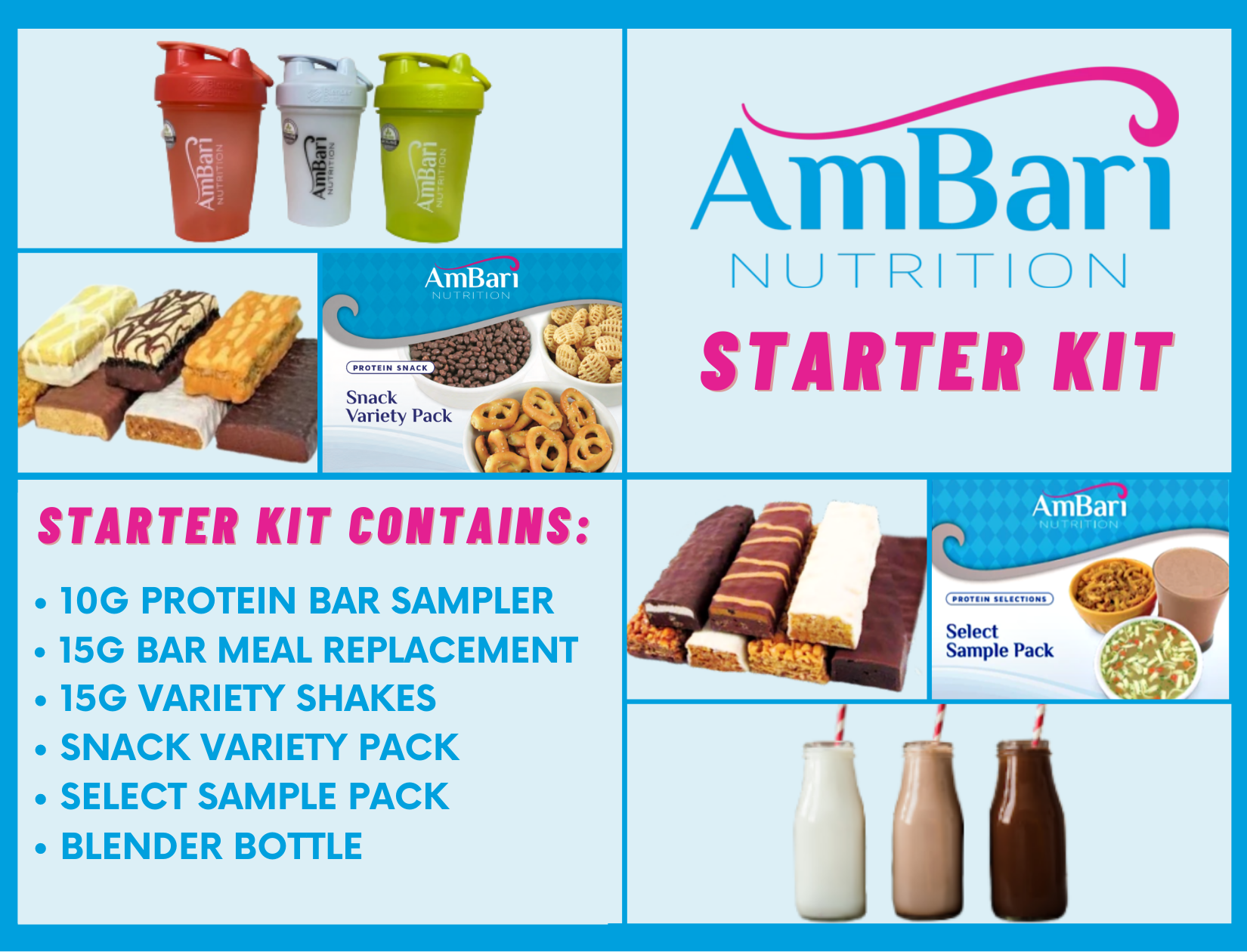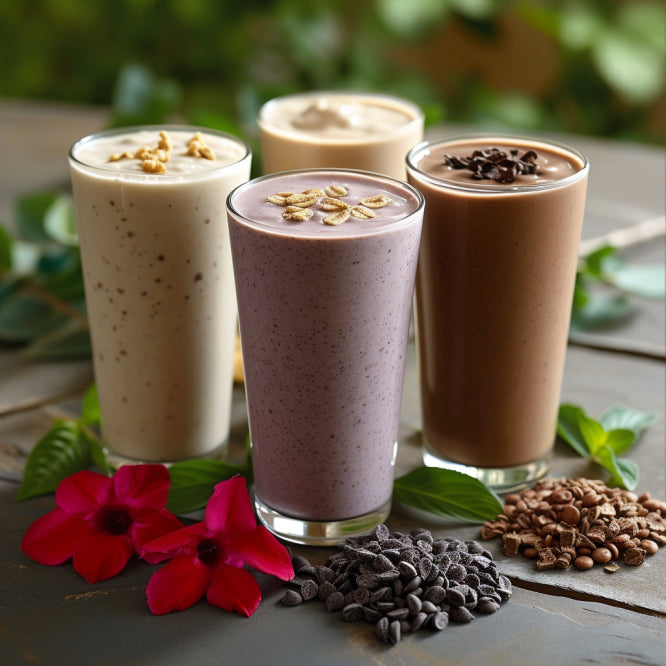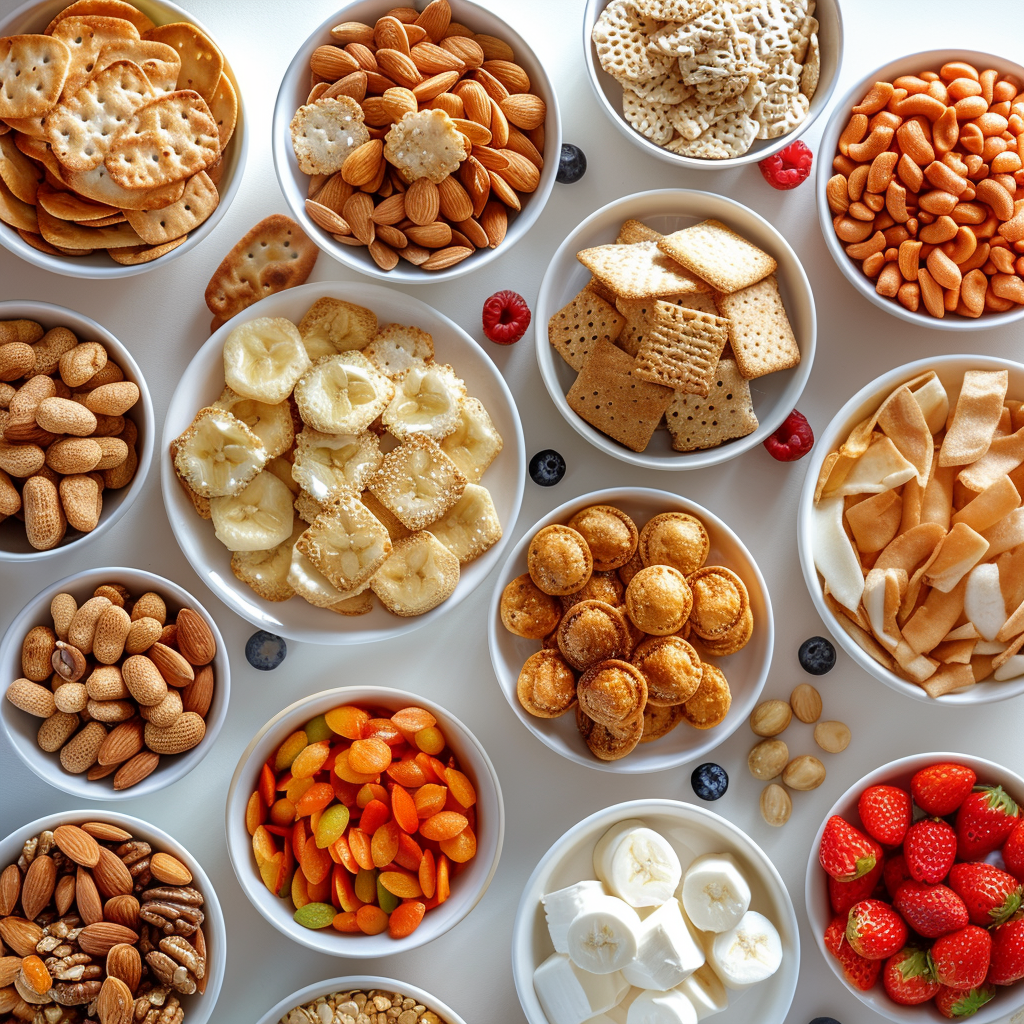Menu
Your cart is empty
Looks like you haven't added anything to your cart yet

Medical Weight Loss Foods: Explore the Science Behind Them
What are Medical Weight Loss Foods?
When it comes to losing weight, we all know it's not just about what you eat but also understanding what's in the food you consume. Welcome to our deep dive into the fascinating world of medical weight loss foods! These specially formulated foods are designed with science-backed nutritional profiles to support effective, sustainable weight loss. But what does this mean, and why is it important to understand the nutritional makeup of these products? Let's jump in and discover the science behind these foods!
The Basics of Nutrition
Before we delve into the specific nutritional details of medical weight loss foods, let's first take a step back and review some basic concepts of nutrition. This will form the foundation upon which we can understand how these specially formulated foods work.
Macronutrients are the nutrients we need in large quantities: proteins, fats, and carbohydrates. Each plays a distinct role in our bodies:
- Proteins are the building blocks of our bodies, essential for tissue repair and growth. They also play a crucial role in creating enzymes and hormones and can provide energy when needed.
- Fats are a concentrated source of energy, help in the absorption of fat-soluble vitamins (A, D, E, K), and are necessary for brain function and hormone production.
- Carbohydrates are our bodies' primary energy source, fueling everything from brain function to physical activity. They also play a role in gut health, as certain types of carbs serve as food for our beneficial gut bacteria.
Next, we have micronutrients, which are vitamins and minerals. We need these in smaller quantities, but they're still vital to our health. They perform a myriad of roles, from helping with energy production and immune function to maintaining healthy skin, bone, and blood.
Finally, we shouldn't forget about FIBER and WATER. Fiber aids digestion, helps control blood sugar levels, and can keep you feeling full, which is particularly beneficial for weight loss. Water, on the other hand, is essential for virtually every bodily function, including digestion, nutrient absorption, and maintaining body temperature.
With this basic understanding of nutrition in place, we can now dive deeper into why the nutritional profile of medical weight loss foods is designed the way it is, and how it can aid in your weight loss journey.

Why Nutritional Profile Matters for Weight Loss
The right balance of nutrients doesn't just keep our bodies functioning, it can also significantly impact our weight loss efforts.
First, let's consider calories. A calorie is a unit of energy, and all foods contain them. However, to lose weight, we need to create a calorie deficit, meaning we consume fewer calories than our body uses. This prompts our body to use stored fat for energy, resulting in weight loss.
Here's where the macronutrients - proteins, fats, and carbohydrates - come into play.
Each of these provides a different amount of energy: proteins and carbohydrates provide roughly 4 calories per gram, while fats deliver about 9 calories per gram. But it's not just about counting calories. The type of macronutrients consumed can influence your hunger levels, metabolism, and even where your body stores fat.
- Protein, for instance, is known to reduce appetite and boost metabolism more than the other macronutrients, making it a key player in weight loss.
- Fats, despite having more calories per gram, are also essential. They keep us satiated, meaning we're less likely to reach for unhealthy snacks between meals. However, the type of fat matters – unsaturated fats are generally healthier and can even help reduce levels of 'bad' LDL cholesterol.
- Carbohydrates can be a bit trickier. While they're our body's preferred energy source, not all carbs are created equal. Simple carbs (like sugars) can cause a rapid spike in blood sugar and leave us feeling hungry soon after eating. On the other hand, complex carbs (like whole grains) are digested more slowly and provide sustained energy.
Micronutrients also have a part to play. Certain vitamins and minerals are involved in energy metabolism, meaning they can help our bodies process the food we eat more efficiently.
Finally, fiber is often a secret weapon when it comes to weight loss. High-fiber foods take longer to eat and contribute to feelings of fullness, which can help us eat less overall.
Understanding this intricate dance of nutrients is key to understanding why medical weight loss foods are designed the way they are. In the next section, we'll dive into the nutritional profile of these foods and see how they align with the principles we've just discussed.
Examining the Nutritional Profile of Medical Weight Loss Foods
Armed with our understanding of basic nutrition and its role in weight loss, we’ll look into the nutritional profile of medical weight loss foods. These foods are meticulously designed, keeping in mind the principles we've discussed so far to provide a balanced diet that supports weight loss.
To respect the privacy and proprietary nature of these specific products, we'll discuss the general aspects of these foods rather than exact formulations. However, we encourage you to look into the nutritional information provided for the specific foods you choose to incorporate into your diet.
| Nutrient Type | Role in Weight Loss | Typical Content in Medical Weight Loss Foods |
|---|---|---|
| Calories | Achieving a calorie deficit leads to weight loss | Balanced, to create a calorie deficit without deprivation |
| Protein | Reduces appetite, boosts metabolism | High |
| Fats | Provides satiety, reduces snack cravings | Healthy fats, carefully balanced |
| Carbohydrates | Provides energy, controls hunger (complex carbs) | Complex, for sustained energy and hunger control |
| Fiber | Promotes fullness, aids digestion | High |
| Vitamins & Minerals | Involved in energy metabolism, helps process food efficiently | Fortified with essential vitamins and minerals |
- Protein content: Medical weight loss foods typically have a high protein content. As we discussed earlier, protein can reduce appetite and boost metabolism, both beneficial for weight loss.
- Healthy fats: These foods are also designed to contain healthy fats that provide satiety, helping to control hunger pangs and cravings between meals. They are mindful of the type and quantity of fat used to ensure it aligns with your weight loss goals.
- Complex carbohydrates: Instead of simple sugars that may cause a spike in blood sugar, medical weight loss foods usually contain complex carbohydrates. These provide sustained energy release, keeping you satiated for longer and helping control hunger.
- High in fiber: These foods often contain a good amount of dietary fiber. As we know, fiber helps you feel full, promoting less calorie intake and aiding digestion.
- Vitamins and Minerals: Medical weight loss foods are usually fortified with essential vitamins and minerals. This ensures you're getting your daily nutrient needs met, even when consuming fewer calories.
The nutritional profile of these foods is thus designed to provide a balanced diet, high in nutrients but lower in calories, to help create that all-important calorie deficit without leaving you feeling starved or nutritionally deprived. In the next section, we will compare this profile with regular foods to further illustrate the benefits of choosing medical weight loss foods for your weight loss journey.
Comparison with Regular Foods
Let's take a common lunch scenario: a sandwich with processed meats, cheese, a spread of mayo, and a side of chips. While this meal can certainly be delicious and provide immediate satisfaction, it's typically high in simple carbs, unhealthy fats, and sodium. Plus, it may not provide a substantial amount of fiber or essential vitamins and minerals. This means you may find yourself feeling hungry again soon after eating, leading to excess calorie consumption throughout the day.
Now, consider replacing this meal with a medical weight loss food option. A high-protein, high-fiber meal replacement shake, for example, could provide a balanced blend of nutrients designed to keep you satiated longer. It would likely be lower in calories, and the high protein and fiber content could help control your appetite for the rest of the afternoon. Plus, if it's fortified with essential vitamins and minerals, you're also ensuring your body gets the nutrients it needs to function optimally.
The key difference here is the focus on nutrient density - getting the most nutrients for the least amount of calories. Medical weight loss foods are designed to be nutrient-dense, providing you with essential macronutrients and micronutrients without the excess calories often found in regular foods.
Of course, this isn't to say that all regular foods are bad or that medical weight loss foods are the only option. It's about finding a balance that works for you and supports your weight loss goals.
The Role of Meal Replacement Shakes and Bars in Weight Loss
Meal replacement shakes and bars have become popular tools in the world of weight management, and for good reason. These products, when used correctly, can offer a convenient and effective way to control calorie intake while ensuring essential nutrients are supplied to the body.
Meal Replacement Shakes
Meal replacement shakes are typically high in protein and fiber, and low in sugars and unhealthy fats. They come in a variety of flavors, providing options for different taste preferences.
- Convenience: One of the biggest benefits of meal replacement shakes is convenience. They're easy to prepare - just add water or milk - and can be consumed on the go.
- Calorie Control: These shakes are designed to provide a balance of nutrients while keeping the calorie content relatively low, helping to create the calorie deficit necessary for weight loss.
- Satiety: The high protein and fiber content in these shakes can help you feel full and satisfied, reducing the likelihood of overeating later in the day.
Meal Replacement Bars
Meal replacement bars offer similar benefits but in a solid form. They are portable, require no preparation, and come in a variety of flavors.
- Portability: Bars are incredibly handy. They can be easily carried in a purse or pocket, making them a great option for those busy days when sitting down for a meal isn't possible.
- Nutrient-Dense: Like shakes, these bars are designed to provide a good balance of essential nutrients, including a substantial amount of protein and fiber, for relatively fewer calories.
- Snack Replacement: Bars can also serve as a healthier alternative to typical high-calorie, low-nutrient snacks.
While meal replacement shakes and bars can be a great tool for weight management, it's important to remember that they should not replace all meals. Real, whole foods offer a variety of nutrients that are essential for overall health. A balanced approach, where these products are used to replace one or two meals or snacks per day, combined with regular physical activity, is the most sustainable and healthy way to achieve weight loss goals.
How to Incorporate Medical Weight Loss Foods into Your Diet
Understanding the nutritional profile of medical weight loss foods is a great start, but putting this knowledge into action is where the real change happens. Here are some practical tips on how to incorporate these foods into your daily routine:
- Start Gradually: If you're new to medical weight loss foods, don't overhaul your entire diet at once. Instead, start by replacing one meal or snack a day and gradually increase as you get comfortable with the change.
- Balance and Variety: Even with medical weight loss foods, it's important to maintain a varied diet. Try different products in your range to get a mix of nutrients and avoid boredom.
- Pair with Whole Foods: Complement these foods with fresh fruits, vegetables, lean proteins, and whole grains to ensure you're getting a wide variety of nutrients. For instance, you might pair a meal replacement shake with a side of mixed berries, or a protein bar with a handful of raw nuts.
- Listen to Your Body: Everyone's body responds differently to changes in diet. Pay attention to how you feel after consuming these foods. If you notice any discomfort or if something doesn't feel right, it may be worth consulting a healthcare professional.
- Combine with Exercise: Diet alone may not be enough for sustainable weight loss. Pair your new eating plan with regular physical activity. This doesn't have to be intense workouts - even brisk walking, dancing, or household chores can help burn calories.
- Stay Hydrated: Don't forget about water! It's essential for digestion, nutrient absorption, and overall health. Plus, sometimes thirst can be mistaken for hunger, so staying hydrated can also help manage your appetite.
- Read Labels: Get into the habit of reading food labels. This can help you better understand what you're putting into your body and ensure you're staying within your daily calorie and nutrient goals.
Conclusion
The science behind medical weight loss foods is truly fascinating. It's all about understanding the intricate balance of nutrients that fuels our bodies while supporting weight loss efforts. Incorporating these foods into your daily routine, alongside a healthy lifestyle, can be a game-changer in your weight loss journey. Remember, though, that it's all about balance - these foods can be a tool for weight loss, but they shouldn't replace all meals. Real, whole foods and regular physical activity are also essential components of a sustainable and healthy weight loss plan.
Written By: Carrie H. Carrie is a dedicated health and nutrition writer with a strong background in medical and scientific research. She is driven by a passion for helping others lead healthier lives, delving into the latest scientific research. Combining evidence-based knowledge with practical advice, Carrie strives to provide accurate and valuable information on health, nutrition, and wellness. Her ultimate aim is to empower readers, enabling them to make informed choices about their well-being. |
Reviewed By: Dr. Huffman Dr. Kevin D. Huffman, D.O., is a leading board-certified bariatric physician with extensive expertise in treating obesity. He has trained countless healthcare providers and founded American Bariatric Consultants to develop protocols and training materials sought by medical societies, pharmaceutical companies, patients, and hospitals. Dr. Huffman's impact extends beyond patient care as he prepares physicians for board certification, expanding access to this vital treatment. |
- Choosing a selection results in a full page refresh.




































